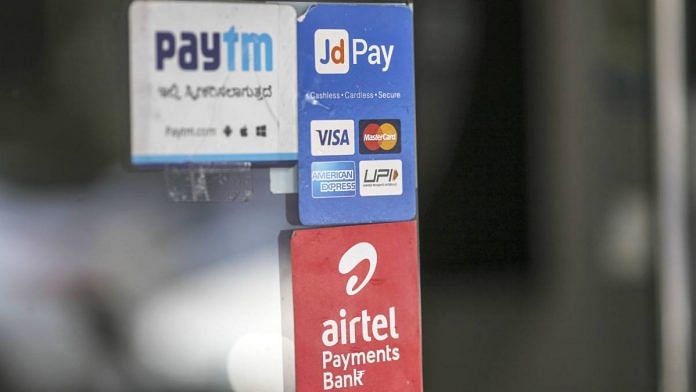New Delhi: Well known Indian business houses and global e-commerce firms have indicated their interest in floating new umbrella entities for payment systems and are set to apply with the Reserve Bank of India (RBI) ahead of the 31 March deadline.
Corporate houses like Reliance Industries and Tata group, e-commerce and tech firms like Facebook, Amazon and Alphabet Inc, firms in the payment business like Paytm, Visa and MasterCard and banks such as ICICI Bank, Kotak Mahindra Bank, HDFC Bank and Axis Bank are all coming together in various consortiums to set up new umbrella entities (NUEs).
ThePrint explains what an NUE is and what makes this payment space attractive.
Also read: RBI allows retail investors to directly bid for govt bonds — how it works & what it means
What is a NUE?
New umbrella entities can be set up as for-profit or not-for-profit companies that will be allowed to undertake a host of activities in the retail payments space. RBI had issued guidelines for setting up these entities in August last year after considering this issue over the last few years. According to the guidelines, these entities can offer a host of retail payment services including setting up of ATMs, offering white-label, point of sale terminals, Aadhaar-based payments and remittance services, and develop newer payment methods. They can also operate clearing and settlement systems for participating banks and non-banks.
Why was NUE envisaged?
At present, many retail payment networks come under the aegis of the National Payments Corporation of India (NPCI). For instance, the popular Unified Payments Interface or UPI, the Immediate Payment Service or IMPS, Bharat Bill Pay and the Aadhaar-enabled system are some of the retail payments operated by the NPCI.
NPCI is, however, incorporated as a not-for-profit company and is owned by many state-owned and private banks. RBI proposed setting up more of such entities to encourage competition and to offer more retail payment solutions to customers.
Also read: Why cryptocurrencies became an investor favourite in 2020 & how their value is determined
Who can set up NUE?
Entities owned and controlled by Indian citizens with three years experience in the payments ecosystem are eligible to be promoters of NUEs. Entities holding more than 25 per cent in an entity will be considered as promoters and one promoter cannot hold more than 40 per cent stake in a NUE. This means that one NUE will need to have at least three stakeholders. Foreign investment is also allowed in the NUE, subject to guidelines. The entity will need to have a minimum paid-up capital of Rs 500 crore.
Why are firms interested in being NUE promoters?
Bloomberg reported Thursday that at least four consortiums are vying for licenses to set up NUEs. One consortium consists of Amazon, Visa, ICICI Bank, Axis Bank and two fintech startups Pine Labs and BillDesk. The second consortium is led by Reliance Industries Ltd and includes Facebook and Alphabet Inc.’s Google.
The third consortium is led by Paytm and includes Ola among a few other companies while the fourth consortium has Tata Group, Mastercard, Bharti Airtel Ltd., Kotak Mahindra Bank and HDFC Bank.
All these firms are looking to get a larger pie of the growing digital retail payments market in India. With growing awareness and improving network connectivity, more Indians are using online modes of payment as seen by the rapid growth registered in UPIs.
In the recent months, the UPI interface has seen an average 230 crore transactions monthly involving more than Rs 4 lakh crore.
The current guidelines allow for a NUE to offer a range of payment-related services. The wording of the guidelines are such that companies are hopeful that they may be allowed to also offer a wide range of retail offerings to their customers. The only stipulation that the guidelines state about operations is that the new products offered should be able to interact and be interoperable with the systems operated by NPCI.
Also read: Forget Mukesh Ambani vs Bezos, kirana king Udaan is the new kid to beat in India’s retail war




What is in it for these companies? I am afraid The Print ought to have explained it. Do they earn commission on the payments processed by them? What is their Revenue Model?